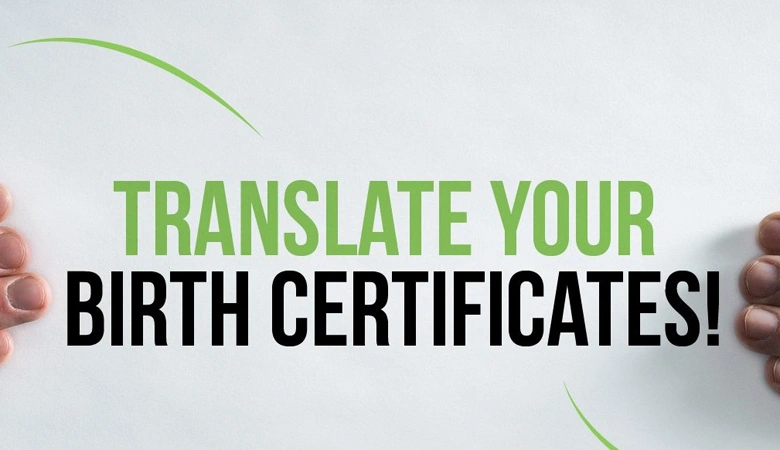The Role of Birth Certificate Translation in International Adoptions
- Celebrity
-
- UPDATED March 27, 2025

by Kristine Bowman
855 shares
International adoption is a process that is full of legal and document procedures across many countries. The child’s birth certificate from the country of origin is a key document that needs to be translated properly. There are several reasons for requiring translation:
Verifying the Child's Identity and Eligibility for Adoption
A birth certificate translation service ensures that a translated birth certificate accurately verifies the child’s identity and legal eligibility for adoption. It confirms essential details like the child’s name, date and place of birth, and parents’ names. This helps prevent identity fraud or illegal adoptions without proper consent.
It also tells whether the birth parents’ rights were terminated or the child was declared legally abandoned. This makes them available to be adopted into a new family. It is vital to get an accurate translation because otherwise, children might get adopted when their birth parents still have custody rights.
Facilitating Legal Procedures Across Border
A birth certificate translation enables legal processes to proceed across borders. The adoptive parents’ country and state, if in the US, require valid documentation to finalize an international adoption.
The foreign birth certificate must be translated into English by a certified translator. This way officials can verify the child’s details and confirm the adoption meets both legal and ethical requirements. Accurately translating the certificate facilitates intercountry communication and legal recognition of the adoption.
Preserving the Child’s Culture and Identity
In addition to legal purposes, the birth certificate also provides a tangible connection to the adoptee’s cultural origins. This can be very meaningful for the child as they grow older and understand more about their adoption story.
The original certificate documents details like their name at birth as well as the city, region, and country where they were born. While the adoption process will change the child’s name and nationality officially, having this cultural background preserved is psychologically valuable. The translated document allows them to retain a sense of their roots.
Overcoming Language Barriers with Accuracy
Birth certificates for international adoptions are issued in the child’s native language, while the adoptive parents typically only understand English. This language gap is overcome through professional translation services. There are intricacies when translating foreign names, locations, legal terminology, dates, and more, which only experienced translators can handle appropriately.
Without accurate translation, the risk of miscommunication or legal issues can jeopardize the adoption. Relying on low-quality software translation is inadequate when so much is at stake in the process. The nuances involved require human translation subject matter expertise.
Meeting Strict Accreditation Standards
US adoption agencies must meet accreditation standards under the Hague Convention to facilitate intercountry adoptions. Part of the accreditation demands properly translating key documents like birth certificates. This ensures ethical conduct and prioritizes the child’s well-being throughout the adoption process.
The US State Department specifically states that improper document translation cannot be used to justify an incomplete or falsified adoption record. This strict requirement underscores how vital certified translations are.
Overcoming Challenges in Translation
While translation is critically important, it also poses some unique challenges:
- Complex foreign names or locations with no English equivalent may be spelled incorrectly if not transliterated properly.
- Technical terminology, abbreviations, or names of foreign institutions on the certificates may lack direct translation.
- Handwritten documents or poor image quality create difficulties in deciphering text accurately.
- Nuances in cultural context around familial relationships, legal statuses, or procedures may be misconstrued.
- Dates or ages may be formatted differently across languages and systems.
Only a professional translator intimately familiar with foreign birth certificates can adeptly handle these complexities.
Selecting a Reputable Translation Service
To meet all legal and ethical obligations, adoption agencies must select a reputable translation service. Warning signs of an unqualified service include:
- No native speakers for the language of the birth certificate.
- No strict processes for selecting highly qualified translators.
- No proofreading or editing checks to confirm accuracy.
- No subject matter expertise specifically with foreign birth certificates.
On the other hand, a good agency will have strict hiring and quality control, good customer service, and be specialized in the adoption domain. Many agencies provide notarization or some other official certification of the translated documents.
It is also recommended to select a translation company located in the adoptive parents’ home country. That means they will have standardized processes developed for that country’s legal system. They know the US state specific regulations and also the terms of different countries.
Cost Implications of Translation
Professional human translation is more expensive than automated translation, but should be viewed as an essential upfront investment. Legal processes won’t be able to move forward without certified translations. If documentation has errors, the costs and emotional burden of sorting out issues later on are much greater.
While translation does represent a fixed cost, it pales in comparison to the many other expenses involved in international adoption. Travel requirements, agency fees, and post-adoption costs can amount to $40,000 or higher. Yet the accuracy of the child’s foundational documents is what makes the entire process possible.
In cases of international adoption, the child’s birth certificate serves as their passport into their new family and new country. As such, obtaining expert human translation is imperative, not just for legal reasons but for honoring the child’s identity and culture. This vital translation facilitates uniting children in need of families with parents waiting to adopt across borders.